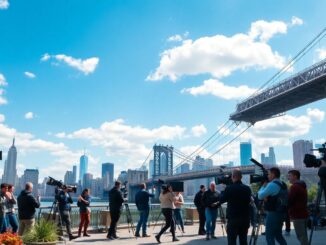As Oasis prepares for their comeback, we explore the complexities of fan expectations and the realities of nostalgia.

Topics covered
As Oasis gears up for their much-anticipated reunion tour, a pressing question arises: is the buzz surrounding this comeback driven by genuine musical prowess, or is it simply a wave of nostalgia washing over us? In a landscape where reunions often lead to disappointment, it’s crucial to unpack the business dynamics at play and what they mean for both the fans and the band.
Digging into the numbers behind the excitement
The enthusiasm for Oasis’s reunion tour is electric, with tickets flying off the shelves almost instantaneously. But, let’s take a closer look at the figures. Sure, a reunion can spark a surge in demand, but we also need to examine the churn rate of concert attendance.
How many fans will actually show up, and how many are just buying tickets to relive the glory days? The data reveals a more complex narrative.
Consider the profitable nature of reunion tours. Average ticket prices for these events have soared, often outpacing inflation and breaking records.
However, this model’s sustainability raises a red flag. Will fans keep coming back for pricey tickets, or will the thrill of nostalgia fade faster than it ignited? The long-term success of such tours depends heavily on the quality of the performances and the emotional bond fans still share with the music.
Learning from past reunions
Examining previous reunions offers us vital insights. Bands like The Eagles and Fleetwood Mac have navigated this terrain with mixed results. While they initially basked in success, audience fatigue often crept in, leading to dwindling interest and lower ticket sales on subsequent tours. I’ve witnessed too many startups falter by underestimating the importance of sustained engagement. The same logic applies here: a one-off nostalgia trip might not translate into a sustainable business model.
Oasis finds itself in a unique spot. With a treasure trove of hits, the challenge lies in crafting a setlist that resonates with both die-hard fans and newcomers alike. As we look forward to the upcoming tour, it’s essential to recognize that the band’s legacy isn’t just built on a handful of chart-toppers but on a rich catalog that has evolved over the years. The potential for disappointment looms if the setlist feels like a mere checklist of hits, rather than a meaningful representation of their musical journey.
Key lessons for founders and music pros
For those of us in the startup and music industries, there are crucial takeaways from Oasis’s comeback strategy. First and foremost, understanding your audience is vital. Just as product-market fit (PMF) is essential in tech, aligning with fan expectations is key in music. A band that fails to read the room risks alienating its core supporters.
Next, consider the balance between lifetime value (LTV) and customer acquisition cost (CAC). While those initial ticket sales may be tempting, maintaining interest through high-quality performances and authentic engagement is critical for building a loyal fanbase. This means not just riding on nostalgia but also pushing the envelope within their established brand.
Finally, managing expectations is crucial. We’ve seen it time and again—the hype can often overshadow reality. For Oasis, it’s not merely about filling stadiums; it’s about crafting a memorable experience that honors their legacy while keeping the essence of the music alive. Striking this delicate balance could be the difference between a triumphant return and a brief moment in the spotlight.
Actionable takeaways
- Analyze your audience’s sentiment and expectations before launching a product or event.
- Think about the long-term implications of your strategy: short-term gains shouldn’t eclipse sustainable growth.
- Keep innovating and engaging; don’t rest on your past laurels.
- Be transparent about what fans can expect; managing hype is crucial for maintaining trust.
As we wait for the first notes of Oasis’s reunion tour, let’s remember that while nostalgia can be a strong motivator, it’s the quality of the experience that will ultimately define the success of this comeback.




